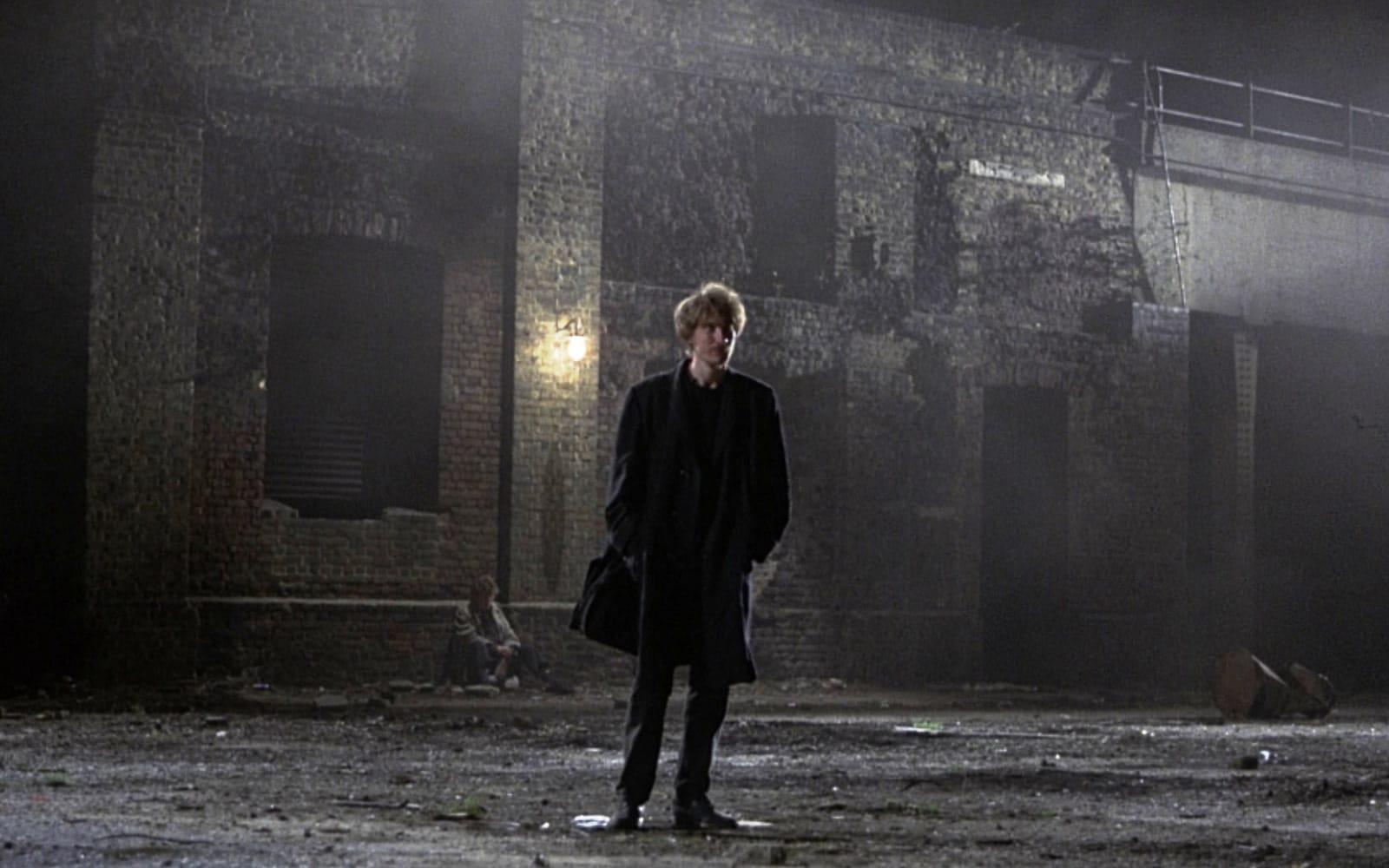Naked by Mike Leigh (Review)

When we first encounter Johnny, the “hero” of Mike Leigh’s caustic Naked, he’s raping a woman in a seamy Manchester back alley. Fearing retribution, he steals a car and makes a midnight journey to London to shack up with an ex-girlfriend. From there, he launches into a series of nocturnal sorties through the city’s underbelly, leaving a swath of sexual, physical, intellectual, and spiritual devastation in his wake.
So why in the world do I find myself identifying with him as much as I do?
Anyone who knows me will tell you I’m a cynic. My wife last witnessed one my diatribes, done in the supermarket as I went off on some rant about celebrity magazines and the stupidity of the clothing worn by the women in front of us. I’ve been a cynic for a long time, and one thing I’ve realized is that there’s a great deal of righteous safety in cynicism. Sure, it’s cool to be a cynic, especially in this day and age, but the appeal of cynicism is the safety of it.
From that safety, you can launch into a million diatribes, confronting the ills of society with contempt and disdain, proud in the fact that you — and you alone — know how screwed up things are. Like the Cynics of ancient Greece, who pursued after Virtue by pointing out the flaws in everything else around them, it is often quite hypocritical. But it’s so easy, and it feels so right, especially when scorning something as obviously vapid as Us Weekly (who is currently trying to determine just how pregnant Katie Holmes is).
Johnny isn’t just a cynic, however. He’s a black hole, attracting people with his intellect and wit only to point out their shortcomings before thoroughly and systematically demolishing their notions, beliefs, and values. During one of the film’s most riveting scenes, he’s taken in by Brian, a security guard whose only purpose in life is to watch over an empty building. As Brian goes on about the thrills of his job and his plans for the future, Johnny lays into the man’s naïveté, deconstructing his notions of God and existence and throwing in some conjecture about the Apocalypse for good measure.
Johnny is cynicism personified, and though we never learn what set him on such a destructive path, we do see the cancerous results. It’s difficult to discern if Johnny believes in anything anymore, or if it’s just become a game for him. Whatever the case, he’s fully unable to truly connect with anyone anymore. Either he twists their words back on them, perhaps out of some twisted desire to get them to think about their own lives, or attempts to abuse them or gain some sort of power over them.
But even that leaves him disgusted and unfulfilled, and so he throws himself through the night, trying to find something or nothing — as if it matters anymore.
However, despite being quite the bastard, it’s difficult to dismiss Johnny entirely. For all of their poison and bile, there is truth in Johnny’s words. For example, when Louise, his ex, asks him if he came to London because he was bored, Johnny’s sneer of a response is an accurate summation of one of modern society’s failings:
Was I bored? No, I wasn’t fuckin’ bored. I’m never bored. That’s the trouble with everybody — you’re all so bored. You’ve had nature explained to you and you’re bored with it. You’ve had the living body explained to you and you’re bored with it. You’ve had the universe explained to you and you’re bored with it. So now you want cheap thrills and, like, plenty of them, and it doesn’t matter how tawdry or vacuous they are as long as it’s new, as long as it’s new, as long as it flashes and fuckin’ bleeps in forty fuckin’ different colors. So whatever else you can say about me, I’m not fuckin’ bored.
Although David Thewlis gets most of the praise for his work as Johnny, and rightfully so, one shouldn’t discount Greg Cruttwell, who portrays one of the most evil, amoral bastards ever committed to celluloid. On the surface, the slick, well-manicured, Porsche-driving Jeremy is the complete opposite of Johnny. But Jeremy is just as caustic and abusive, spouting off deplorable platitudes about the healthiness of AIDS and wondering if women like being raped or not.
But unlike Johnny, who occasionally seems willing to own up to emptiness of his situation, and whose rants contain hints of someone trying to strike out against meaninglessness, Jeremy has no such qualms. He is utterly soulless and callous, and he doesn’t care at all. At least we glimpse moments of sadness and regret in Johnny’s wasted visage. In Jeremy’s face, all we ever get is a smirk followed by a proposition.
Naked is a difficult film to watch. There’s no other word for it. And in praising the film — if that’s the right word — I don’t want to attempt to gloss over it’s more unsavory elements. The sexual content is particularly difficult, not because it’s graphic but because it’s so cold and cruel. One feels especially sorry for the drugged out Sophie, who is misused by both Johnny and Jeremy and left a shaking wreck. While I don’t agree that the film is misogynistic — we are never once led to believe the mens’ treatment of the women is ever laudatory in any way whatsoever — I do see why people might hold to that opinion.
However, looking back on the film, I don’t feel any sense of moral outrage or indignation at the improprieties on display. Rather, I feel a great deal of sadness, both for Johnny and because I recognize in Johnny the same dark cynicism and tendency to alienate that I myself can often exhibit.
